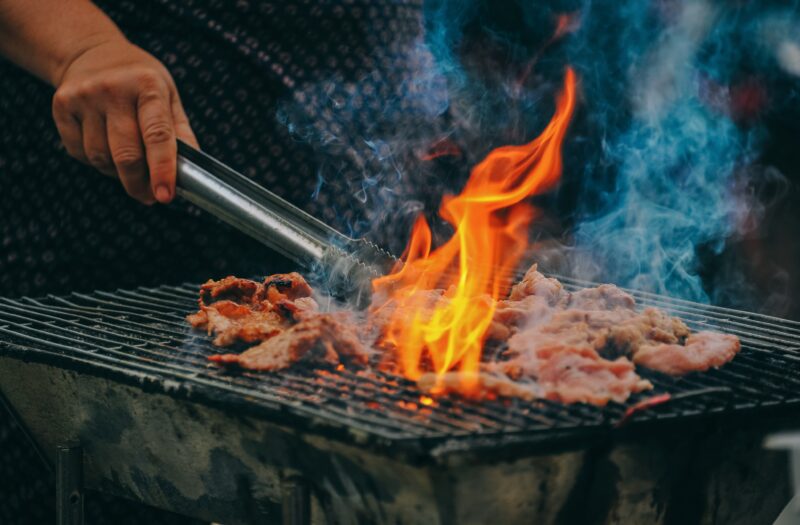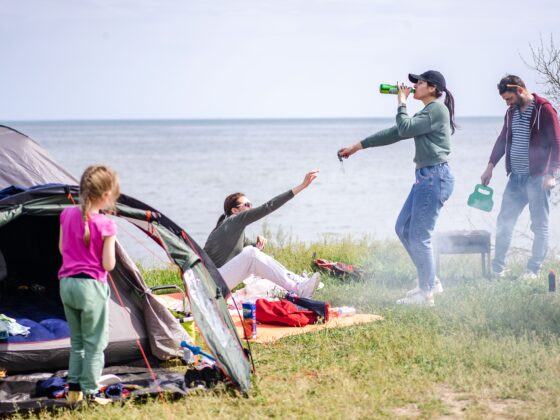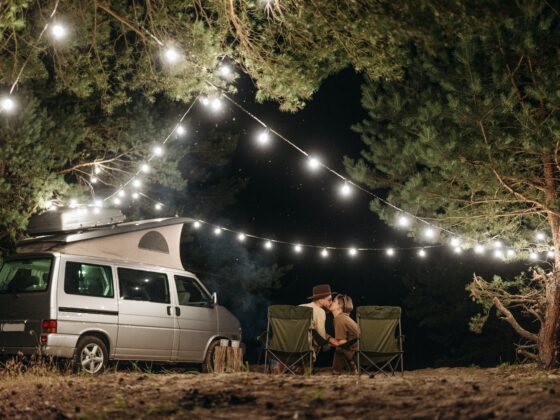Welcome to Camp Cookouts, your go-to guide for all things camping cuisine! Planning a camping trip? Don’t forget to pack your appetite and follow these food storage tips to ensure safe and delicious meals in the great outdoors.
When it comes to camping, food storage is essential for maintaining the quality and safety of your perishable items. Whether you’re a seasoned camper or a first-timer, having a well-organized and properly stocked cooler can make a huge difference in your camping experience.
At Camp Cookouts, we understand the importance of keeping your food fresh and safe during your outdoor adventures. That’s why we’ve put together this comprehensive guide on food storage tips for camping trips. From packing your cooler with the right ingredients to using proper storage techniques, we’ve got you covered.
Join us as we delve into the world of camp cookouts and explore the best strategies for keeping your food fresh, maintaining food safety, and maximizing the flavor of your meals. So, grab your apron, and let’s get cooking!
Remember, an enjoyable camping trip starts with well-preserved and delicious food. Stay tuned for our expert tips and tricks to make your camp cookouts a mouthwatering success.
Importance of Proper Food Storage During Camping Trips
Proper food storage is crucial when it comes to camping trips. The last thing you want is to spoil your food and risk foodborne illnesses. Here are some reasons why you should prioritize food storage during your camping adventures:
- Preserving Food Quality: Proper food storage helps maintain the freshness and flavor of your ingredients. It prevents them from spoiling prematurely, ensuring that you can enjoy delicious meals throughout your camping trip.
- Preventing Foodborne Illnesses: Foodborne illnesses can quickly ruin a camping trip. By following food safety guidelines and using proper storage techniques, you can reduce the risk of bacterial contamination and keep your meals safe for consumption.
- Minimizing Food Waste: Effective food storage allows you to minimize food waste by keeping your ingredients fresh for longer. This not only saves you money but also helps protect the environment by reducing unnecessary food waste.
Some of your options for food storage are storage boxes for non-perishable items (Thor Storage Box) and coolers or portable fridges for perishable items (Alipicool Car Fridge). Now that we understand the importance of proper food storage let’s dive into some food safety guidelines specifically tailored for camp cookouts.
Food Safety Guidelines for Camp Cookouts
When it comes to food safety, there are a few important guidelines to keep in mind during your camp cookouts. These guidelines will help ensure that your meals are safe to eat and minimize the risk of foodborne illnesses. Follow these tips to keep your food safe during your camping trips:
- Keep it Clean: Before handling any food, make sure to wash your hands thoroughly with soap and clean water. This helps remove any bacteria or contaminants that may be present on your hands.
- Have the Right Cooking Equipment: Having the right camp cooking equipment ensures that your food preparation is sanitary and the finished product is cooked thoroughly and the right way. Invest in camp cooking materials such as a Stanley Basecamp Cookset to address your camp cooking needs.
- Separate Raw and Cooked Foods: To prevent cross-contamination, always keep raw meats and seafood separate from cooked foods. Use separate cutting boards, utensils, and storage containers to avoid any potential contamination.
- Cook Food to the Right Temperature: Use a food thermometer to ensure that your meats are cooked to the appropriate temperature. This will help kill any harmful bacteria that may be present in the food.
Now that we’ve covered the essential food safety guidelines let’s discuss the importance of choosing the right containers for food storage.
Choosing the Right Containers for Food Storage
When it comes to food storage during camping trips, choosing the right containers is crucial. The right containers can help keep your food fresh, prevent leaks, and make it easier to organize your ingredients. Here are some factors to consider when selecting containers for your camp cookouts:
- Insulation: Look for containers that offer insulation to help maintain the temperature of your perishable items. Insulated containers can keep your food cold or hot, depending on your needs.
- Durability: Opt for containers that are durable and can withstand the rigors of camping. Look for materials like stainless steel or hard plastic that can handle rough handling and resist damage.
- Sealing Mechanism: Ensure that your containers have a secure and airtight sealing mechanism. This will prevent any leaks and keep your food fresh for longer.
Now that we’ve covered the importance of choosing the right containers let’s move on to preparing and packing perishable foods for your camping trips.
Preparing and Packing Perishable Foods
Properly preparing and packing perishable foods is essential for maintaining their quality and safety during camping trips. Follow these steps to ensure that your perishable ingredients remain fresh and delicious:
- Plan Your Meals: Before you start packing, plan your meals in advance. This will help you determine the quantity of perishable ingredients you need and minimize food waste.
- Pack in a Cooler: Use a well-insulated cooler to pack your perishable foods. Make sure to pre-chill the cooler before adding the ingredients to maintain the desired temperature.
- Use Ice Packs: Place ice packs or frozen water bottles in the cooler to keep the temperature low. This will help prevent your perishable items from spoiling.
- Separate by Temperature: Group your perishable items based on their temperature requirements. Keep meat, poultry, and seafood separate from other ingredients to prevent cross-contamination.
Moving on, let’s explore non-perishable food storage options for your camping trips.
Non-Perishable Food Storage Options
Non-perishable foods are a great option for camping trips as they require minimal refrigeration and can withstand varying temperatures. Here are some essential non-perishable food items to pack for your camp cookouts:
- Canned Goods: Canned goods, such as beans, soups, and vegetables, are excellent options for camping trips. They have a long shelf life and can be easily stored in your cooler or backpack.
- Dried Foods: Dried foods like pasta, rice, and dried fruits are lightweight, easy to store, and require minimal preparation. They are perfect for quick and convenient meals during your camping adventures.
- Snacks and Granola Bars: Pack a variety of snacks and granola bars for quick energy boosts during your camping trips. These non-perishable items are easy to pack and provide a tasty treat on the go.
Now that we’ve covered non-perishable food options let’s focus on tips for storing food in a cooler.
Tips for Storing Food in a Cooler
A well-packed cooler is essential for maintaining the freshness and safety of your perishable food items. Follow these tips to ensure that your cooler is properly organized and your food stays cold:
- Layering Technique: Start by placing a layer of ice packs or frozen water bottles at the bottom of the cooler. This creates a cold base for your perishable items.
- Separate by Categories: Group similar items together and use separate containers or bags to keep them organized. This makes it easier to find what you need and prevents cross-contamination.
- Pack Efficiently: Fill any empty spaces in the cooler with additional ice packs or insulation material. This helps maintain a consistent temperature and prevents air from circulating, keeping your food colder for longer.
Now that we’ve covered tips for storing food in a cooler let’s move on to campfire cooking and food storage.
Campfire Cooking and Food Storage
Campfire cooking is a quintessential part of any camping trip. However, it’s important to practice proper food storage and cooking techniques to ensure a safe and delicious experience. Here are some tips for campfire cooking and food storage:
- Safe Cooking Temperatures: Use a food thermometer to ensure that your food is cooked to the appropriate temperature. This is especially important when grilling meats and poultry over a campfire.
- Proper Storage of Leftovers: If you have any leftovers from your campfire cooking, make sure to store them properly in sealed containers. Place them in a cooler to keep them fresh and safe for the next meal.
- Prevent Cross-Contamination: Keep raw and cooked foods separate to avoid any potential cross-contamination. Use separate utensils and cutting boards for handling raw meats and cooked foods.
Now that we’ve covered campfire cooking let’s discuss the proper disposal of food waste during your camping trips.
Proper Disposal of Food Waste
Properly disposing of food waste is essential for maintaining a clean and eco-friendly camping environment. Here are some guidelines for disposing of food waste during your camping trips:
- Pack It Out: If you’re camping in a location without proper waste disposal facilities, make sure to pack out your food waste. Use sealed bags or containers to store your food waste and dispose of it properly when you return to civilization.
- Avoid Wildlife Interactions: Food waste can attract wildlife, so it’s important to dispose of it in a way that minimizes interactions with animals. Store your food waste securely and away from your campsite to prevent any unwanted visitors.
Now that we’ve covered the proper disposal of food waste let’s move on to essential items for camp cookouts.
Essential Items for Camp Cookouts
To ensure a successful and enjoyable camping cooking experience, it’s important to have the right tools and equipment. Here are some essential items to pack for your camp cookouts which you can find in an outdoor store:
- Camp Stove or Grill: A portable camp stove or grill is a must-have for cooking meals during your camping trips. Choose one that suits your cooking needs and is easy to transport.
- Cooking Utensils: Pack a set of cooking utensils, including a spatula, tongs, and a knife. These tools will come in handy for preparing and serving meals.
- Cookware and Dinnerware: Bring along lightweight and durable cookware and dinnerware, sCamp Cookouts: Food Storage Tips For Camping Tripsuch as pots, pans, plates, and utensils. Opt for materials like stainless steel or enamel that can withstand outdoor cooking.
Now that we’ve covered essential items for camp cookouts let’s wrap up our comprehensive guide.
Conclusion: Enjoying Safe and Delicious Meals During Camping Trips
Proper food storage is vital for maintaining the quality, safety, and flavor of your meals during camping trips. By following the food storage tips we’ve discussed, you’ll be well-prepared to enjoy safe and delicious meals in the great outdoors.
Remember to prioritize food safety, choose the right containers, prepare and pack perishable foods properly, and consider non-perishable options for convenience. Follow our tips for storing food in a cooler, practice safe campfire cooking, and dispose of food waste responsibly.
With the right tools and equipment, you can elevate your camp cookouts to a new level of culinary delight. So, grab your apron, pack your ingredients, and embark on a camping adventure filled with memorable meals and outdoor fun.



